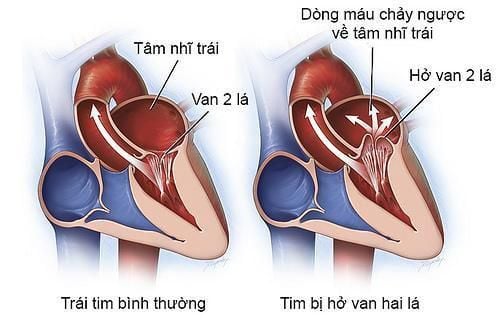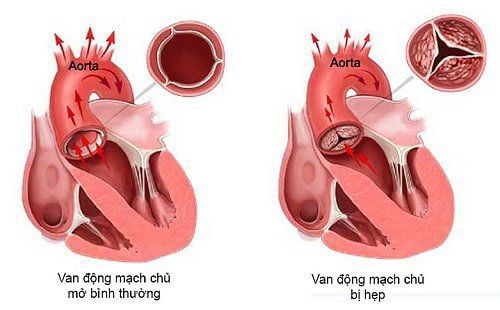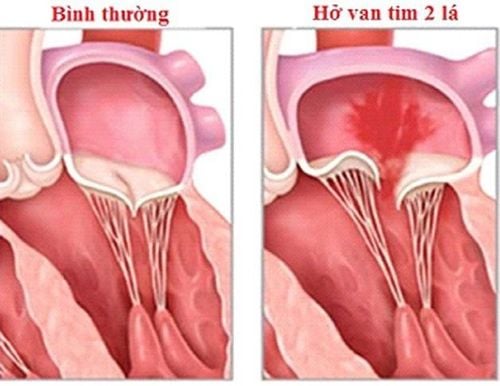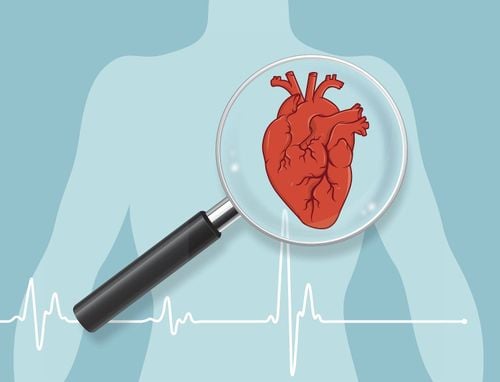This is an automatically translated article.
The article is professionally consulted by Cardiology & Thoracic Surgery doctors - Cardiovascular Center - Vinmec Central Park International General Hospital.Valve replacement or valve repair in patients with mitral valve disease can be performed with minimally invasive open heart surgery. This is an effective, highly aesthetic treatment method, especially for patients with mitral valve disease.
1. What is mitral valve disease?
Heart valves play an important role in the pumping action of the heart because the heart valves open and close gently to help blood flow in a certain direction. Therefore, when the heart valve has a problem with the operation, it will have a significant impact on the patient's health.Mitral valve disease can be caused by stenosis or regurgitation. Patients with mitral regurgitation will need surgery when severe mitral regurgitation has symptoms such as shortness of breath, chest pain; through ultrasound can see impaired heart function; Asymptomatic mitral regurgitation with no impairment of cardiac function but with atrial fibrillation or elevated pulmonary artery pressure also requires surgery.
Mitral stenosis when the area of the mitral orifice is smaller, making it difficult for blood to flow from the left atrium to the left ventricle. The cause of mitral stenosis in Vietnamese is largely due to pre-existing rheumatic heart disease. When the valve hole area is small, the left atrium is dilated, the pulmonary artery pressure is high, or it causes thrombotic complications, atrial fibrillation, surgery or mitral valve replacement is indicated.
Currently, there are two methods of mitral valve surgery: mitral valve repair surgery and mitral valve replacement surgery depending on the specific lesion of the valve leaflet, done through the traditional midsternal incision or through a less invasive incision. endoscopy support.

Hở van tim 2 lá
2. Mitral valve repair with minimally invasive open heart surgery
If people with mitral regurgitation are detected early, they can still lead a normal life with a reasonable medication regimen and regular health checkups.
When the extent of your heart valve damage is severe but not too much, doctors will appoint mitral valve repair surgery to reduce the narrowing or regurgitation of the heart valve.
For valves that are narrow due to sticking to the valve edges, it can be solved by cutting and fixing the stuck valve edges.
Depending on the mechanism causing mitral regurgitation, there will be different ways to narrow the annulus diameter to help the leaflets close together.
Performing minimally invasive open-heart surgery to repair the mitral valve helps to preserve the patient's natural mitral valve structure, so the risk of infection or the effect of anticoagulants after surgery will be significantly reduced.
3. Mitral valve replacement with minimally invasive open heart surgery
In case mitral valve repair surgery is not suitable for the damage of the valve, it is necessary to perform mitral valve replacement surgery.
Usually there are two types of valves used to replace:
Using biological valves: this is a heart valve taken from the heart of an animal after processing to remove components that cause rejection and partially repaired. To place them in the body, the animal heart valves will be placed on a metal or plastic support. Because bio-valves are made from biological materials similar to human tissue, patients will not have to use anti-rejection drugs after surgery, and do not need long-term anticoagulants. The average lifespan of a biological valve is 8-10 years, depending on the person; Using a mechanical valve: this is an artificial valve, made from materials such as metal, carbon, plastic and ceramic, they all have the common feature of having a longer life than biological valves. However, the mechanical valve is made of metal, so it can activate the blood clotting process and form thrombus that stick to the heart valve, causing blockage of the heart valve. For patients with mechanical valve replacement, it is necessary to use anticoagulation for life to maintain an appropriate level of coagulation, to avoid thrombosis causing occlusion of the valves.
4. Advantages of minimally invasive open-heart surgery with mitral valve disease
High aesthetics due to small surgical scars, hidden in the natural folds of the body.
The recovery time is shorter than other surgical methods; Shorter hospital stay; Affordability; The risk of death after surgery is low.
5. Notes after minimally invasive open heart surgery for mitral valve disease
Do not carry or do heavy work for 6-8 weeks after surgery to avoid putting pressure on the incision; For mental comfort, work, gentle exercise until the health fully recovers; Get enough sleep, don't use stimulants or caffeine; Follow a healthy diet; Regular and regular exercise regime; Control blood pressure and cholesterol in the blood.

Nên vận động nhẹ nhàng sau khi phẫu thuật
6. Where should minimally invasive open heart surgery be performed?
All Vinmec International Hospitals nationwide can now repair and replace the mitral valve with minimally invasive open-heart surgery with a methodical, strict procedure, ensuring safety Safe, accurate and highly effective treatment.
Before performing surgery, patients are screened initially to assess the correct diagnosis; determine the degree of risk of surgery; Look for contraindications and relative contraindications if present or when screening is indicated. Screening steps include:
Do laboratory tests: Transthoracic echocardiography; Transesophageal echocardiography (the case of transthoracic echocardiography has not been evaluated); Straight chest x-ray; ECG ; Coronary MSCT if the patient is elderly, at risk for coronary artery disease; Blood chemistry ; Other tests for open heart surgery; Preoperative treatment is with discontinuation of cardiovascular drugs, anticoagulants and antiplatelets as in routine cardiac surgery. After the surgery, the patient was followed up after surgery according to the following 3 timelines:
Right after surgery: perform cardiac resuscitation: Early extubation; Monitor bleeding, heart failure, arrhythmia, kidney failure, thromboembolic complications, hematoma in the groin area where the canule is placed; After inpatient Cardiology: Monitoring arrhythmias: Having a monitor to monitor the electrocardiogram; Monitoring infection status: Clinical and subclinical assessment; Early mobilization: Mobilize as soon as possible, do respiratory physiotherapy; Discharge plan: Take medicine; discharged from the inpatient Cardiology Department; adjust anticoagulation dose if any and periodically re-examine by appointment; Long-term follow-up: Time: Visit the clinic after 07 days, 30 days and periodically by appointment; Anticoagulation treatment: According to anticoagulation regimen; Comorbidities: Prevention of rheumatic heart disease; Complications after hospital discharge: ECG, echocardiography check.
The above procedure at Vinmec aims to help improve surgical efficiency and ensure patient safety; minimize the possible complications after surgery.
At Vinmec, advanced equipment and a team of experienced, well-trained doctors and professional patient care services will help patients have the most peace of mind experience when Minimally invasive open-heart surgery for the treatment of mitral valve disease.
In April & May 2021, when there is a need for medical examination and treatment at Vinmec Times City International General Hospital, customers will enjoy dual incentives:
- Free specialist examination and discount 50% of many cardiac checkup packages such as:
+ Basic Cardiovascular Screening Package
+ Hypertension Checkup Package
+ Heart Failure Checkup Package
+ Coronary Cardiovascular Examination Package
+ Comprehensive Cardiovascular Checkup Package
- 50 off % of cost for customers with post-examination treatment indications. The program is limited to the corresponding technique of each hospital and to customers who perform this treatment technique for the first time at Vinmec.
Please dial HOTLINE for more information or register for an appointment HERE. Download MyVinmec app to make appointments faster and to manage your bookings easily.













